Do Essential Oils Damage Granite
Essential oils have gained popularity for their various uses, from aromatherapy to cleaning. When it comes to granite countertops, using essential oils may not be the best idea.
We will explore the chemical components of essential oils and the composition of granite to understand how essential oils can damage this natural stone. We will also discuss the best essential oils to avoid for granite and provide tips on how to protect and clean your granite countertops effectively.
Let’s dive in!
Key Takeaways:
What Are Essential Oils?
Essential oils are natural compounds extracted from plants that capture the plant’s scent and flavor, or ‘essence.’ They are typically created through distillation or cold pressing methods, preserving the beneficial properties of the plant.
These oils have been used for centuries for various purposes such as aromatherapy, beauty products, and household cleaning.
- Tea tree oil, for example, is known for its antibacterial and antifungal properties, making it a common ingredient in skincare products.
- Lavender oil is often used for its calming and relaxing effects.
- Eucalyptus oil is popular for its ability to open up the airways and relieve congestion.
What Is Granite?
Granite is a natural stone widely used in construction, countertops, and decorative elements due to its durability, heat resistance, and aesthetic appeal. It is an igneous rock formed from the slow crystallization of magma beneath the Earth’s surface.
Granite is renowned for its outstanding durability, making it an ideal material for high-traffic areas. Its heat resistance is another key characteristic that sets it apart, making it perfect for kitchen countertops where heat exposure is common. The aesthetic appeal of granite lies in its varied colors and unique patterns, adding a touch of elegance to any space. It comes in different types such as slab granite, tiled granite, and modular granite, offering flexibility in design and installation.
Granite finds applications in a diverse range of industries including architecture, interior design, and sculpture due to its versatility and longevity. This premium building material requires minimal maintenance with regular sealing to prevent stains and maintain its luster. With proper care, granite can last a lifetime, making it a timeless choice for both residential and commercial projects.
Can Essential Oils Damage Granite?
While essential oils are natural and beneficial for many applications, they can potentially damage granite surfaces if not used with caution. Understanding the interaction between essential oils and granite is crucial to maintaining the stone’s integrity and appearance.
Essential oils contain compounds that can react with the minerals present in granite, leading to discoloration or etching of the surface. The acidic nature of some essential oils, such as lemon or orange, can accelerate the deterioration process, especially when left in contact with the stone for prolonged periods.
It’s important to note that granite is a porous material, making it susceptible to absorbing liquid substances. When essential oils seep into the pores of granite, they can cause staining or alteration of the surface, impacting its texture and color.
To prevent damage, always dilute essential oils with water or a carrier oil before applying them on granite surfaces. Avoid using citrus-based oils or blends with high acidity levels on granite countertops or floors to mitigate the risk of unwanted reactions.
What Are The Chemical Components Of Essential Oils?
Essential oils contain a variety of chemical components, including terpenes, alcohols, phenols, and esters, which contribute to their unique properties and therapeutic effects. Understanding these chemical constituents is essential for safe and effective use of essential oils.
Terpenes are organic compounds that give essential oils their distinct fragrance and flavor. They can also have various therapeutic benefits, such as anti-inflammatory and antibacterial properties. Alcohols like linalool and geraniol provide a balancing effect on the skin and possess antibacterial qualities. Phenols, such as thymol, have strong antiseptic and immune-boosting properties. Esters like linalyl acetate contribute to the calming and soothing effects of essential oils. Knowing how these components interact with each other and other substances is crucial for maximizing the benefits of essential oils.
What Are The Composition Of Granite?
Granite is primarily composed of quartz, feldspar, mica, and other minerals, giving it a distinctive speckled appearance and exceptional hardness. The specific mineral composition varies depending on the source and formation conditions of the granite.
For instance, granites with higher quartz content tend to be lighter in color, while those with more feldspar can display pink or red hues. The presence of mica contributes to the shimmering effect seen in some varieties. The geological processes that form granite, typically through the cooling and solidification of molten rock beneath the Earth’s surface, play a significant role in determining its physical properties. These processes can take millions of years, allowing for the intricate patterns and unique mineral arrangements found in different granite samples.
How Do Essential Oils Damage Granite?
Essential oils can damage granite through etching, staining, and discoloration. The chemical properties of certain essential oils can react negatively with the minerals in granite, leading to visible damage over time.
For instance, citric oils like lemon and orange are especially harmful due to their acidic nature, which can strip away the protective sealant on granite, making it more susceptible to damage. Oils such as tea tree or eucalyptus can seep into the porous surface of granite, causing deep-seated stains that are challenging to remove.
To prevent such issues, it’s crucial to avoid direct contact between essential oils and granite surfaces. Placing a barrier like coasters or cutting boards can help minimize the risk of spills or prolonged exposure.
Etching
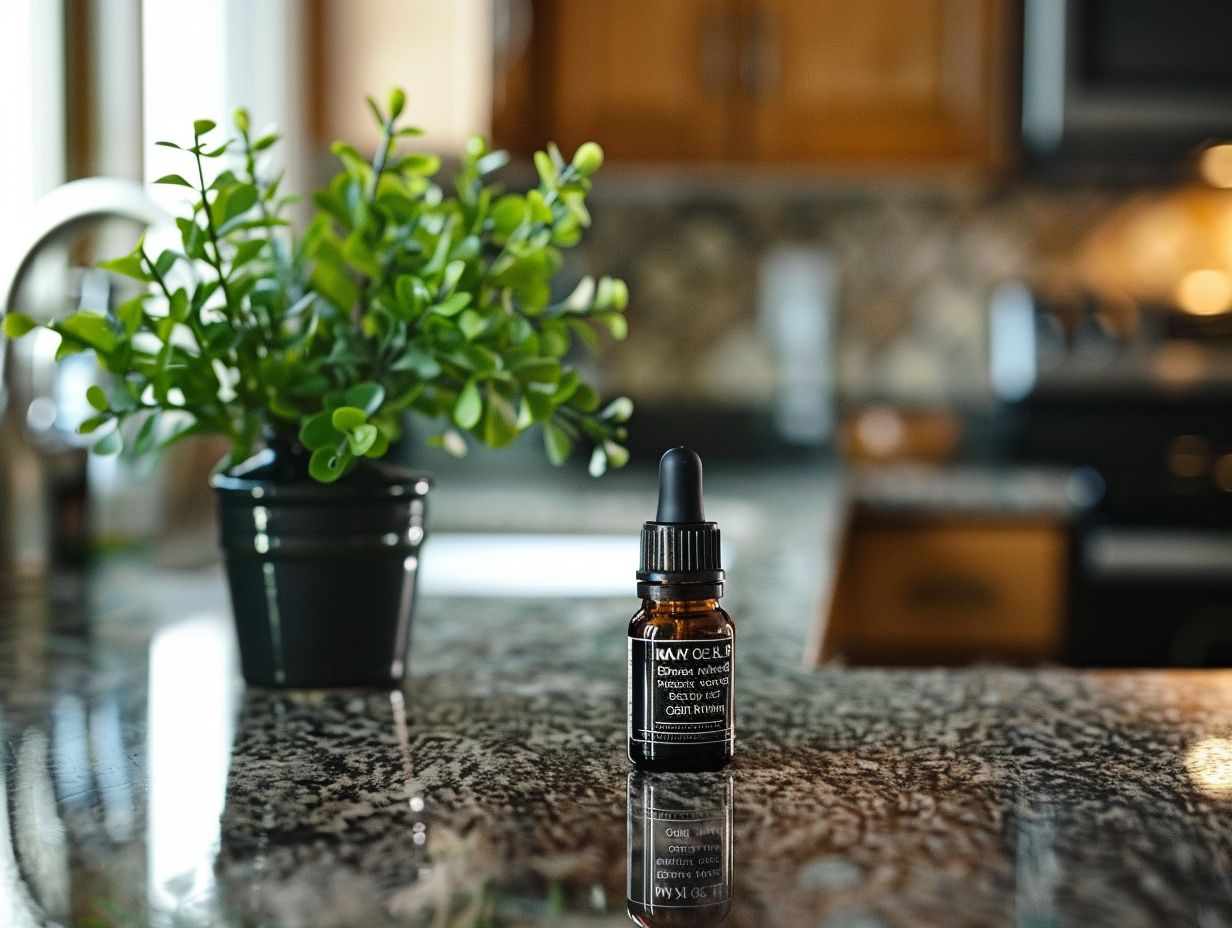
There are various ways to minimize the risks of etching on granite to maintain its pristine look for years to come. One effective method is to seal the granite surface regularly with a high-quality sealer specifically designed for natural stone. This protective barrier helps prevent acidic substances from penetrating the stone and causing etching. It is essential to clean up any spills promptly, especially those containing acidic components, to avoid prolonged contact with the granite.
Choosing to avoid using harsh chemical cleaners or abrasive scrubbing pads when cleaning granite surfaces can also contribute to preventing etching. Opt for pH-neutral cleaning solutions and soft cloths or sponges to gently clean the stone without causing damage. By maintaining a regular cleaning routine and being cautious with the products used on granite, you can significantly reduce the risk of etching and prolong the lifespan of your beautiful granite surfaces.
Staining
Staining of granite occurs when liquids penetrate the porous surface of the stone, leaving behind visible discoloration or dark spots. Essential oils with pigments or dyes can lead to staining if not cleaned promptly.
When essential oils seep into the nooks and crannies of granite surfaces, they can create stubborn stains that require targeted removal methods. The impact of such stains goes beyond aesthetics, as they can compromise the integrity of the stone over time, affecting its natural beauty and longevity. To effectively combat these blemishes, it is essential to understand the composition of granite and select appropriate cleaning agents and techniques that address the specific nature of the stains.
Discoloration
Discoloration of granite can occur due to exposure to harsh chemicals or reactive substances like certain essential oils. Understanding the factors that contribute to discoloration is essential for preserving the natural beauty of granite surfaces.
Harsh chemicals present in cleaning agents can react with the minerals in granite, leading to discoloration. Essential oils that contain compounds like citric acid or vinegar can also cause stains when left in contact with granite for extended periods. Prolonged exposure to sunlight can fade the color of granite over time. To prevent discoloration, it is recommended to use pH-neutral cleaners specifically formulated for granite surfaces. Regularly sealing granite can provide a protective barrier against staining agents, enhancing its longevity.
What Are The Best Essential Oils To Avoid For Granite?
Citrus oils, pine oils, and clove oil are among the essential oils that should be avoided when cleaning or maintaining granite surfaces. These oils contain compounds that can potentially harm the stone and compromise its appearance.
One of the main reasons these oils are damaging to granite is due to their acidic nature. The high acidity levels in citrus oils, for example, can etch the surface of the stone, causing dull spots and visible damage. Pine oils, on the other hand, may leave behind a residue that is difficult to remove and can affect the granite’s natural shine.
To safely clean granite countertops, consider using gentle, pH-neutral cleaners specially formulated for natural stone. Look for products that do not contain harsh chemicals or acids, as these can preserve the beauty and longevity of your granite surfaces without risking damage.
Citrus Oils
Citrus oils, such as lemon and orange oils, contain high levels of citric acid that can corrode the minerals in granite, leading to etching and dull spots. It is advisable to avoid using citrus oils directly on granite surfaces.
When citrus oils come into contact with granite, the citric acid starts a chemical reaction that breaks down the minerals and weakens the protective seal of the stone. This process not only mars the surface but also makes it more prone to stains and scratches over time. Granite, a naturally porous rock, is particularly susceptible to these erosive effects. To prevent irreversible damage, it is crucial to opt for gentler cleaning agents for granite countertops.
Pine Oils
Pine oils are not recommended for cleaning granite as they can leave residues that affect the stone’s appearance and integrity. The oily nature of pine oils can also attract dust and dirt, leading to a dull finish on granite surfaces.
Residue buildup from pine oils can be particularly troublesome on granite, as it may penetrate the porous surface, making it challenging to remove completely. This can result in a hazy or sticky film that detracts from the natural beauty of the stone. Regular use of pine oils can cause the granite to lose its shine over time, necessitating more frequent polishing and maintenance.
For a safer and more effective alternative, consider using a pH-neutral stone cleaner specifically formulated for granite. These cleaners are gentle on the stone while effectively removing dirt and grime without leaving behind any residue. A microfiber cloth is ideal for drying and buffing granite surfaces to a streak-free shine.
Clove Oil
Clove oil contains eugenol, a compound known for its strong antimicrobial properties but can react negatively with the minerals in granite, potentially causing etching or discoloration. Avoid using clove oil directly on granite surfaces.
When clove oil comes into contact with granite, the eugenol in the oil can initiate a chemical reaction that breaks down the minerals present in the stone. This can lead to the formation of etch marks or stains on the surface, compromising the aesthetic appeal of the granite. Prolonged use of clove oil on granite surfaces can gradually deteriorate the sealant, making the stone more susceptible to damage.
It is important to note that using acidic or abrasive cleaners on granite can also pose a risk of damaging the stone. Instead of clove oil, opt for gentle cleaning solutions specifically designed for granite surfaces. A mixture of mild dish soap and warm water can effectively clean granite without causing harm. Regular resealing of the granite can help maintain its luster and protect it from stains and etching.
How To Protect Granite From Essential Oils?
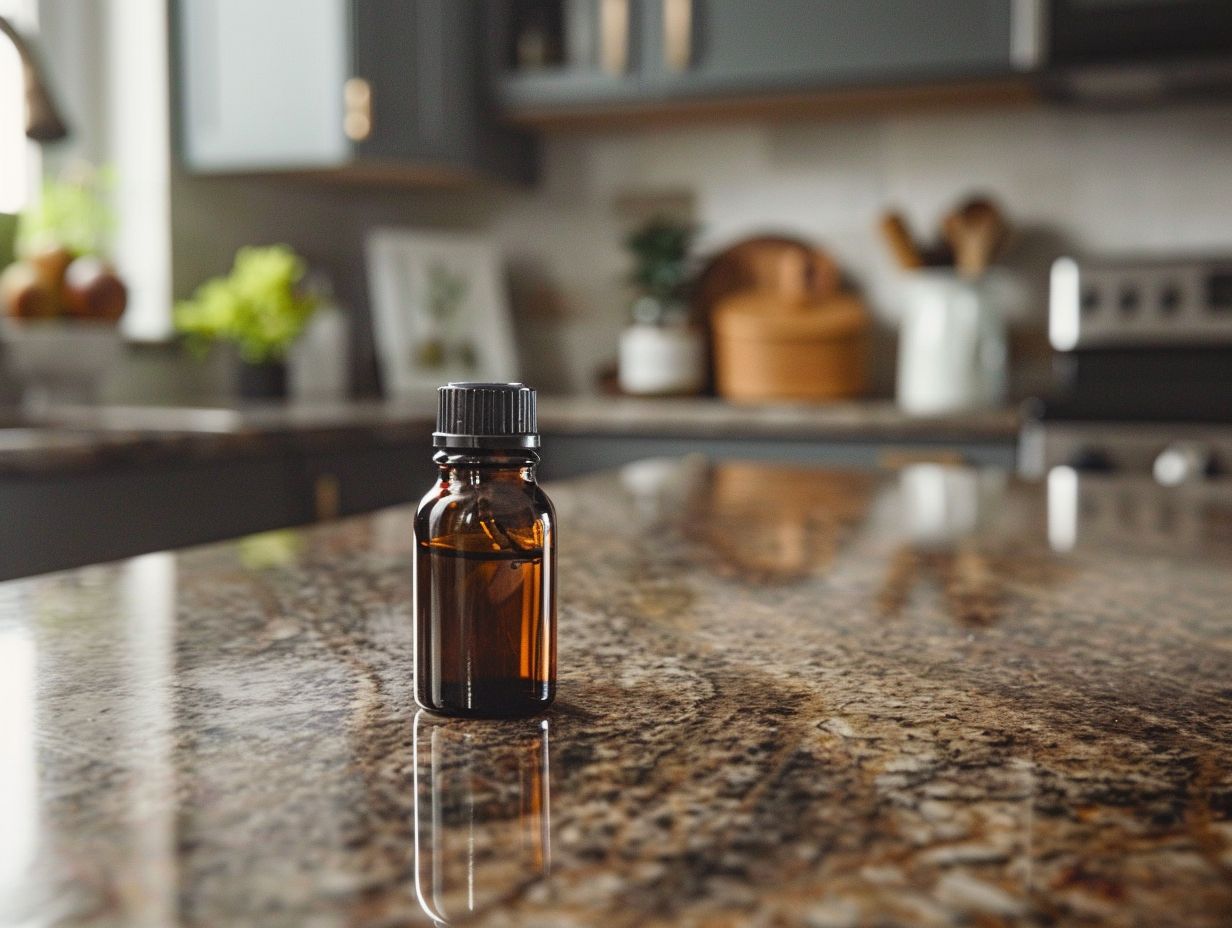
Another crucial step to protect granite surfaces from essential oil-related harm is to avoid using acidic or abrasive cleaners as they can weaken the protective seal and potentially damage the stone over time.
It is advisable to wipe up spills immediately to prevent the oils from penetrating the porous surface of the granite and causing stains. Regularly sealing your countertops with a high-quality sealant helps to create a barrier against oil absorption and maintains the natural luster of the stone.
When cleaning granite countertops, opt for pH-balanced cleaners or simply use warm water and a mild dish soap solution to maintain the integrity of the granite without risking any abrasive effects.
Use A Protective Sealant
Applying a protective sealant to granite creates a barrier that helps prevent essential oils from seeping into the stone and causing damage. Regular resealing is essential to maintain the protective layer and prolong the life of the granite surface.
Sealants act as a shield against moisture, stains, and scratches, preserving the natural beauty of granite countertops or surfaces. To apply a sealant, start by thoroughly cleaning the granite to remove any dirt or residue that could interfere with the sealant bonding process. Choose a high-quality granite sealant recommended for your specific type of granite to ensure effectiveness.
Applying the sealant in even coats with a clean cloth or brush, allowing sufficient drying time between applications, is crucial for optimal protection. After the initial application, regular resealing every 1-2 years is recommended depending on usage to ensure continued protection and longevity of the granite.”
Clean Up Spills Immediately
Promptly cleaning up spills on granite countertops, especially those containing essential oils, can prevent staining, etching, or discoloration. Using gentle cleansers and soft cloths is recommended to avoid damaging the stone.
Spills should be addressed promptly with a blotting motion using a clean, soft cloth. Avoid wiping as it can spread the spill. For tougher stains, create a paste using baking soda and water, applying it to the affected area and covering it with plastic wrap overnight to lift the stain.
When choosing cleaning products for granite, opt for pH-neutral or specially formulated granite cleaners. Stay away from harsh chemicals like vinegar, lemon, or ammonia-based cleaners that can dull or damage the surface.
Use A Neutral Cleaner
Opting for a neutral cleaner when washing granite surfaces helps maintain the stone’s pH balance and prevents chemical reactions that could harm the stone. Mild, pH-balanced cleaners are gentle yet effective for regular granite cleaning.
Neutral cleaners are non-corrosive and do not leave behind any residue, ensuring that your granite countertops remain free from streaks and film. Using harsh chemicals or acidic cleaners can cause etching on the surface of the granite, diminishing its natural beauty over time. By choosing a neutral cleaner, you can protect your granite surfaces while still effectively removing dirt and grime.
It’s essential to select a cleaner specifically formulated for natural stone, as general household cleaners may contain ingredients that can damage granite. Look for phosphate-free and biodegradable options to minimize the environmental impact while caring for your countertops.
Can Essential Oils Be Used To Clean Granite?
Essential oils can be used to clean granite surfaces, but it is essential to exercise caution and follow specific guidelines for safe application. Diluting essential oils, testing on a small area first, and using sparingly are key to using oils effectively on granite.
When considering using essential oils for granite cleaning, it is crucial to understand that not all essential oils are suitable for this purpose. Some oils may be too acidic or harsh for granite surfaces, potentially causing damage. To ensure the safety of your granite, opt for milder oils such as lemon or lavender, which are known for their gentle cleaning properties.
Yes, But With Caution
While essential oils can be used to clean granite, it is crucial to proceed with caution and mindfulness. Diluting oils, avoiding prolonged exposure, and testing on inconspicuous areas are advisable practices to prevent potential damage to the stone.
When incorporating essential oils into your granite cleaning routine, awareness of the type of oil being used is essential. Certain oils, such as citrus-based ones, can be too harsh and cause more harm than good. It’s recommended to opt for milder options like lavender or tea tree oil, which are gentler on the surface of the stone.
Additionally, mixing essential oils with a gentle neutral pH cleaner or warm water can help reduce the risk of direct contact and potential reactions with the granite. This blend creates a balanced solution that combines the benefits of the oils with a safer overall cleaning approach.
Remember that less is often more when using essential oils on granite surfaces. A little goes a long way, so it’s best to start with a small amount and gradually increase if needed. Rushing into heavy applications can lead to residue buildup and potentially compromise the natural properties of the stone over time.
After cleaning with essential oils, it’s crucial to thoroughly rinse the surface with plain water to remove any remaining residue. This step helps maintain the integrity of the granite and prevents any oily buildup that could attract dirt. By following these tips and remaining vigilant about the effects of essential oils on granite, you can strike the right balance between cleanliness and preservation of your stone surfaces.
Use A Diluted Solution
Creating a diluted solution of essential oils and water is recommended for cleaning granite to reduce the concentration of potentially harmful compounds. Proper dilution ratios ensure effective cleaning without risking damage to the stone.
Using diluted essential oil solutions offers numerous advantages when it comes to granite care. By diluting the oils, you lessen the risk of the oil’s strong properties causing any discoloration or damage to the porous surface of the granite. This method also helps in achieving a balanced blend where the oils work effectively without being overpowering. The diluted solution makes it easier to control the amount of oil applied, preventing any excess buildup that could potentially harm the granite over time.
Test On A Small Area First
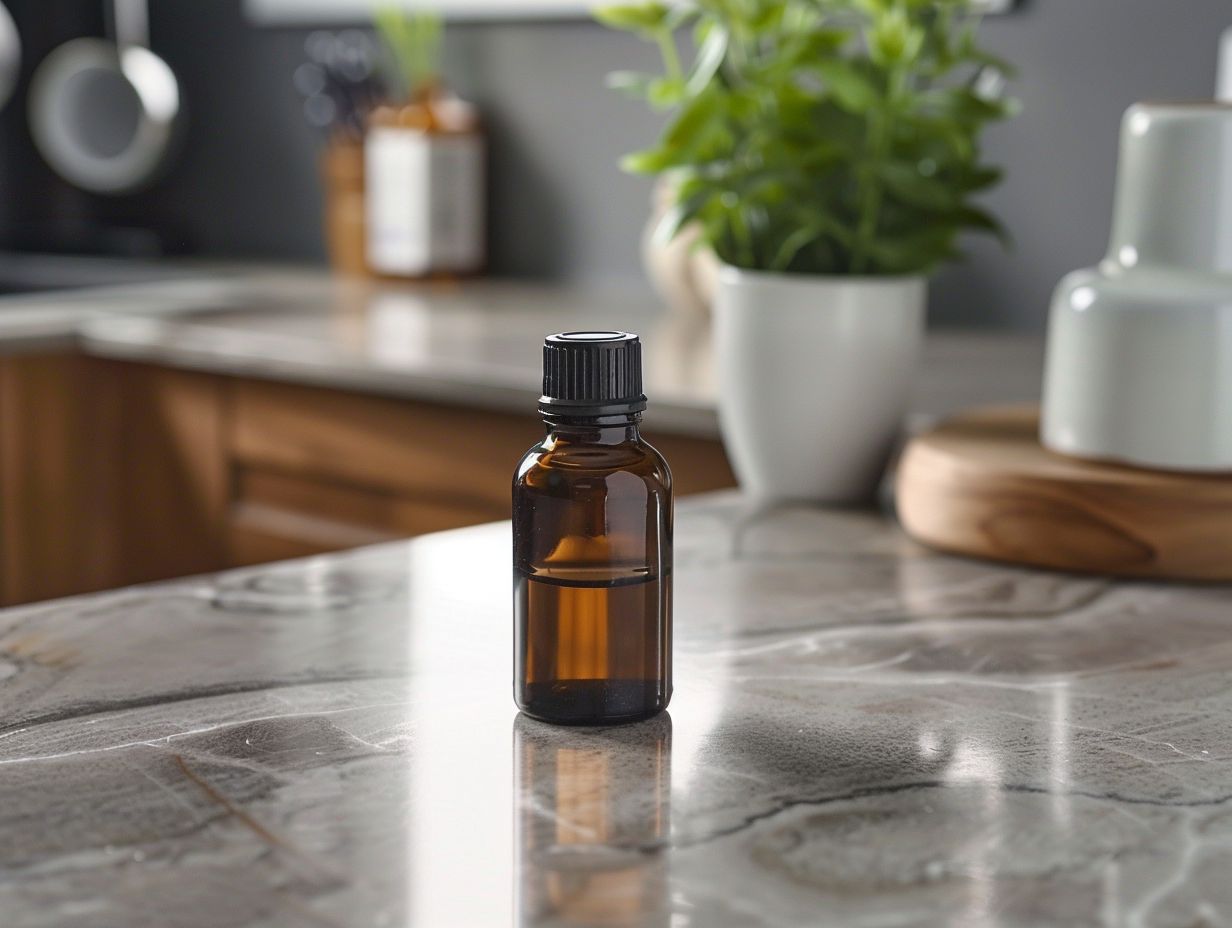
Start by selecting a discreet spot on the granite surface, ideally where any impact will not be noticeable.
- Thoroughly clean the chosen area, removing any dust or debris.
- Apply a small amount of the diluted essential oil or cleaning solution to the spot.
- Allow the solution to sit for 24 hours.
- Observe for any discoloration, staining, or adverse effects on the granite.
Conducting a patch test allows you to safeguard your granite against potential damage and ensures long-lasting beauty and durability.
Frequently Asked Questions
Do Essential Oils Damage Granite?
Yes, some essential oils can damage granite countertops if not used properly.
Which Essential Oils Can Damage Granite?
Citrus essential oils, such as lemon, lime, and orange, can damage granite due to their acidic properties.
How Do Essential Oils Damage Granite?
Essential oils can cause etching or discoloration on granite surfaces if not diluted or if left on for too long.
Can I Use Essential Oils On My Granite Countertops?
Yes, you can use essential oils on granite countertops, but make sure to use them properly and with caution.
What Is The Proper Way To Use Essential Oils On Granite?
To avoid damage, always dilute essential oils with water or a carrier oil before using them on granite surfaces. Also, wipe the surface immediately after using essential oils.
Are There Any Essential Oils That Are Safe To Use On Granite?
Yes, there are essential oils that are safe to use on granite, such as lavender, tea tree, and peppermint. However, make sure to still use them with caution and in the proper dilution.

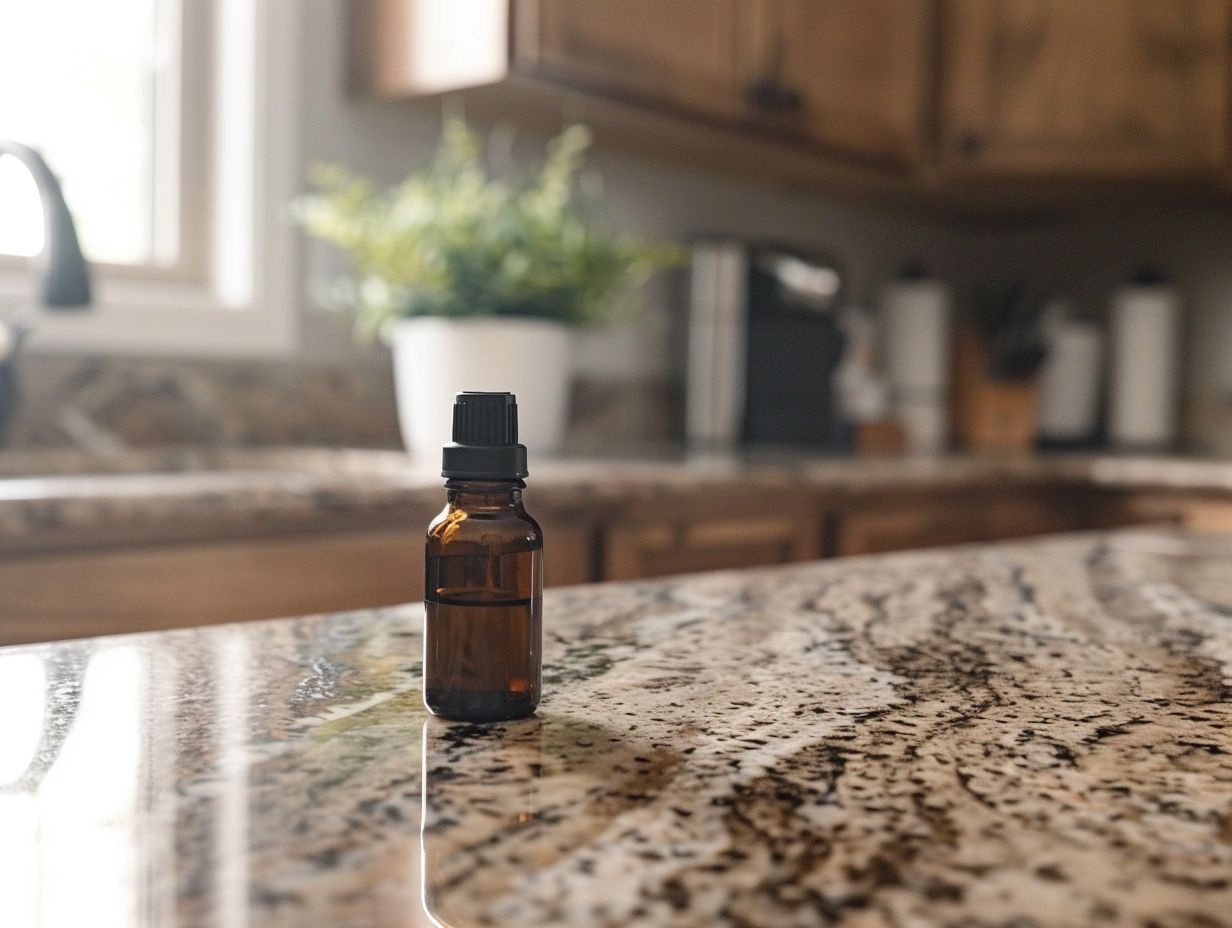




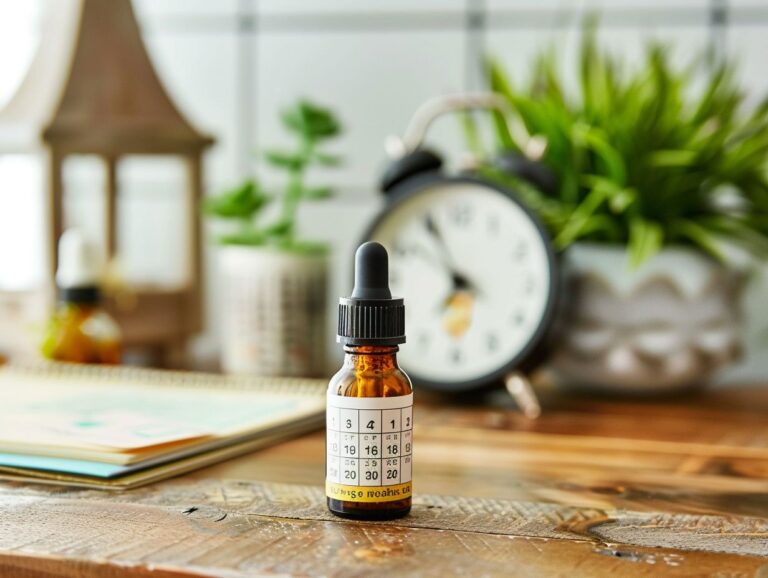
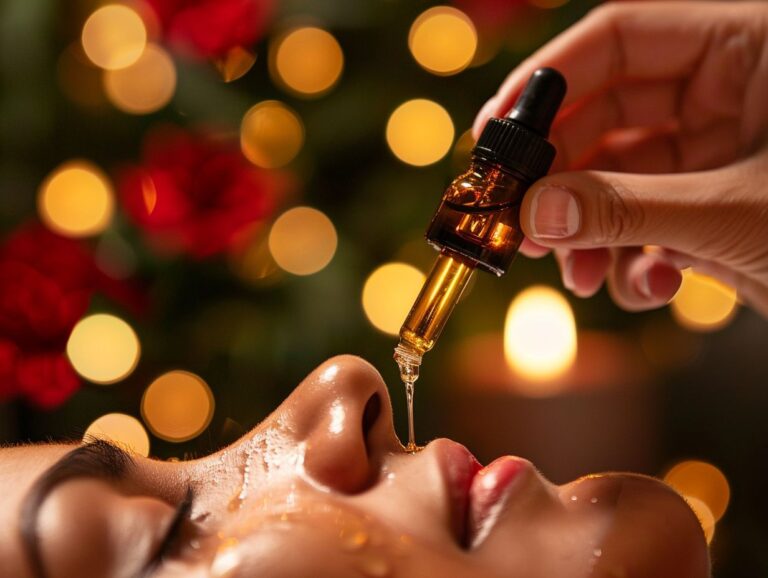
One Comment